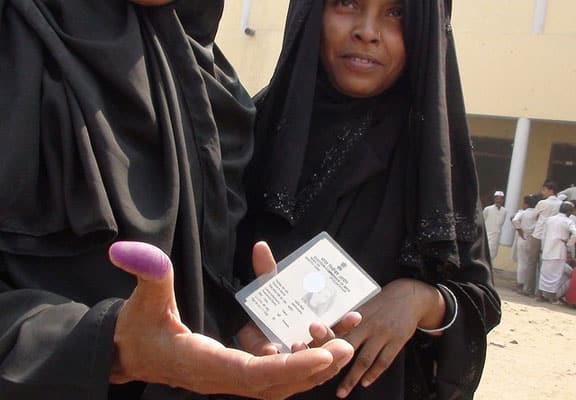

Credit: Nilanjan Chowdhury/Al Jazeera, Al Jazeera English on Flickr, under Creative Commons (CC BY-SA 2.0)
BANGALORE, India (WOMENSENEWS)– “Why don’t they have general elections every year, even every six months ?”
That’s Mohana being cheeky as she listens to the day’s news items being read out to her by a member of a nongovernmental organization in Bangalore, in south India.
The women sitting with her, all slum dwellers and mostly illiterate–whose surnames represent caste, which is why they aren’t used here–laugh, because she has a point.
With general elections set for early 2014, just a few months away, politicians seem to be scurrying to announce measures for empowering women. Meanwhile, a bill for reserving one-third of seats in parliament for women has been languishing since 1996, tabled by successive governments.
But this year, politicians know that the country’s female voters– estimates of their numbers vary between 300 million and 350 million as the voting rolls keep getting updated– could mean the difference between winning and losing.
The two leading political parties are in a close race. The Congress led by Sonia Gandhi, which is now in power, leads a coalition known as the United Progressive Alliance. It faces a tough competition with the rightist opposition party Bharatiya Janata.
Mohana, 32, is excited because a historic Food Security Bill, spearheaded by the Congress party, was approved by parliament in late August. The bill, which promises a major expansion of subsidized grains (rice, wheat and millet) is expected to take effect in 2014 after the technical implementation details are worked out.
It was not specifically intended to promote gender equity, but a clause in the law makes it mandatory to have ration cards in the name of the “women head of the beneficiary family.”
All state governments have been asked to begin re-issuing ration cards in the names of the women of the household. If a household has no adult women or only a female who is below 18, the card can be in the name of the male, but only until the woman in the family turns 18.
Big Bonuses
This promises a couple of big bonuses for women. First, there is the psychological one of being listed as the “head of household.” Then there’s the practical ability to wrest the control of purchasing subsidized grains each month.
Mohana’s husband, a daily wage earner, regularly pawns the family’s ration card to pay for liquor so his wife and children often go hungry until the card is redeemed (with money she earns by taking on additional work as a cleaning maid).
If the ration card were in her name, she could ensure that the family’s food needs took precedence over her husband’s weakness for stopping at the local arrack shop to buy liquor.
“He could still order me to hand over the card when he wants to pawn it, but I will have more courage to defy him if it is in my name,” she says.
Given the traditions in India of women eating last (and least) after feeding the men and children first, this change to the grain subsidy system could be huge for women’s health and food security.
Kusum, 37, who sells vegetables by the roadside to add to her husband’s meager earnings as a cobbler, is also elated at the prospect of being listed as the “head of household.” A victim of domestic violence, she says she could consider leaving him if she could get subsidized food rations in her own name. (Kusum is not her real name; it was changed to shield her identity so she could speak freely about her marital abuse.)
Widening Access
Families listed as BPL (below poverty line) currently qualify for subsidized rice and wheat through a network of ration shops, but only those earning less than $28 a month qualify as BPL. The new Food Security Bill seeks to widen access to subsidized food grains to a whopping 670 million citizens, barring only the well-off families at the top.
With the exception of a few places in the interior where nongovernmental organizations have helped set up shops staffed by women, almost all grain outlets of the Public Distribution System that now handle ration quotas are owned and run by men.
Shopkeepers interviewed for this article weren’t happy about reissuing the cards to women.
“Women will make trouble,” says one shop owner, adding that women are more careful about ensuring that the grain is properly weighed out and insisting on checking. They will also complain about poor quality of grains, he adds, pointing out that the men do not bother since it is the woman’s job to clean the grain and cook it.
A backhanded compliment if ever there was one, since he implies that putting women in charge will curb malpractices and shoddy quality.
Another bonus in the run up to the elections came from an Aug. 30 directive from a parliamentary committee to all state governments mandating that employees who are single women be posted closest to their home towns or places of their choice.
The needs of mothers with small children, the directive adds, have also to be addressed “with empathy.” It suggests flexible work hours to accommodate family obligations.
Sakuntala Narasimhan is a national award-winning Indian journalist-columnist-author with a Ph.D. in women’s studies. She has also taught journalism at the university level.
Would you like to Comment but not sure how? Visit our help page at https://womensenews.org/help-making-comments-womens-enews-stories.
Would you like to Send Along a Link of This Story? https://womensenews.org/story/equalitywomen%E2%80%99s-rights/130909/2014-elections-in-india-set-bait-womens-vote

